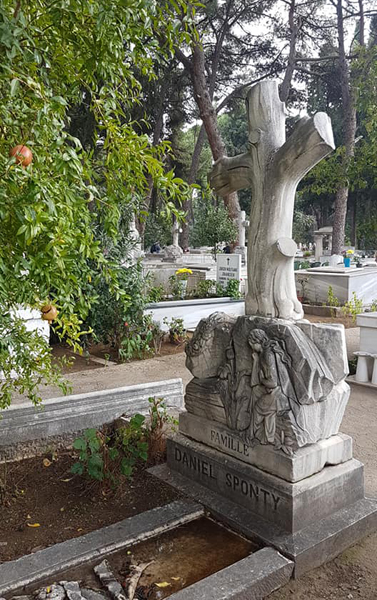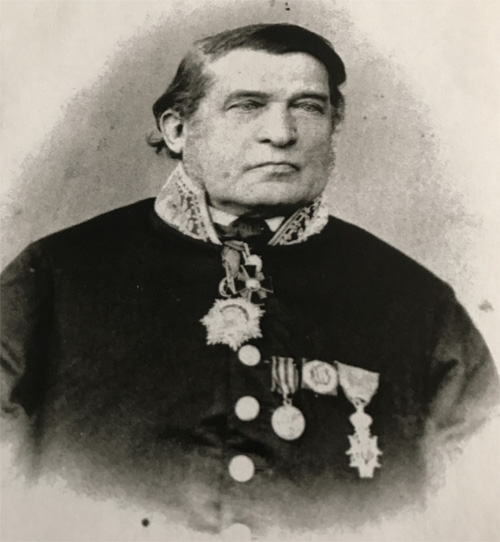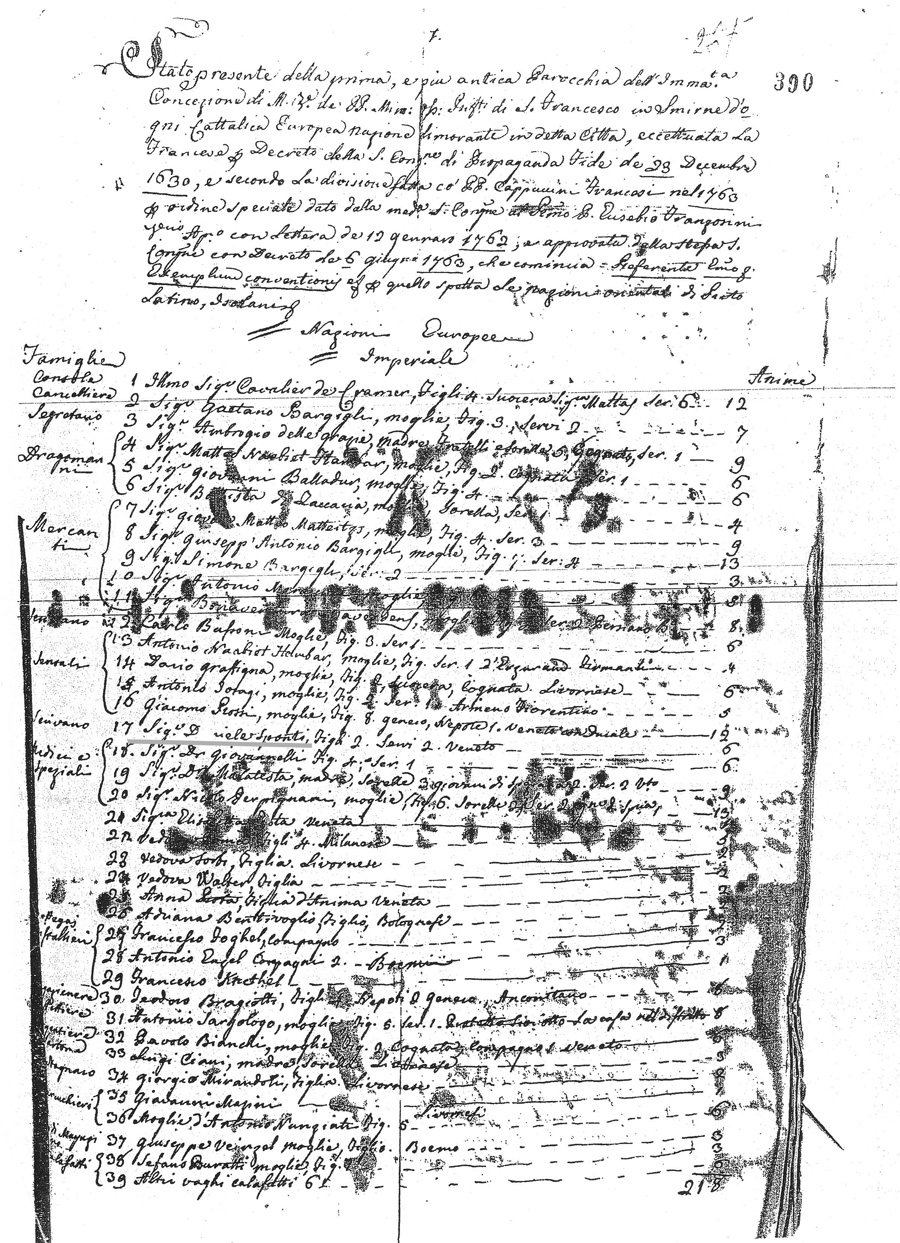
An invitation to post queries to this website
Part of the purpose of this website is to provide the tools and networking ability of Levantine descendants to help build a picture of their ancestors. In addition to our community, this website is open to the broader public and the postings and submissions you can do on the website can act as a way to connect with cousins and also get the informed help of those who have done this journey before and advice from genealogists and historians.
We encourage you to post what you know, indicating the degree of confidence in the material by showing sources, being clear as to what is conjecture and opening questions on what you do not know, or merely suspect.
Unfortunately our studies and scope is limited to the Levantines, however we are aware of other developing groups representing other communities of the Levant and happy to point you in their direction as we feel these fragile histories deserve to preserved and together we can celebrate the struggles and achivements of these multi-national origin communities who clearly loved the lands of the former Ottoman Empire, enough to spend the rest of their days there.
Postings | Obituaries
Elise Martel Cohen
My name is Elise and I recently came across the Levantine Heritage Foundation website while researching the communities of Istanbul. I am trying to track down my father’s family. My father was born in Yesilkoy/Istanbul around 1930 to a French Levantine father and a Turkish mother. He deserted the army, made his way to the U.S. after being deported and escaping (twice!), lived the rest of his life in Chicago where had my identical twin sister and I in 1970 and died in 2010. He never kept in contact with his family for reasons I am unsure of. His father died when he was just 12. His name was Pierre Ferry. My father said he fell down an elevator shaft in the bank of Istanbul (?). Must have been the early 40s. Suspicious indeed, especially considering the taxes levied against ‘foreigners’ at the time. My father was sent to live in an orphanage/monastery after my grandfather’s death.
I write to you to ask for help, and to offer. I understand that there are grad students who can assist with research. I have a Ph.D. in sociology and can help as well in any way, with my own research or for the Levantine Heritage Foundation.
Below is an excerpt from text from a link about the settlers of the Ferikoy district in Istanbul. I have very good reason to believe that my father was Pierre Ferry III, great-grandson of the original (from what he told us, and papers I found when he died. He changed his name upon arriving in the U.S.). I translated the French (through Google) into English and Turkish. The English is below. I’ve added comments in English [in square brackets].
“This is a family of Levantine French who gave his name to the district of Feriköy: the Ferry. We find their traces in the late eighteenth century on the island of Tinos, which belonged to the Ottoman Empire and was the only Catholic island in the Aegean. When the island became independent at the same time as Greece, the family settled in Galata [where my Baba was sent to live, St Benoit? Monestary and orphanage :-( ] where Ferry to prosper in business quickly. The head of the family, Pierre Ferry [My father’s father was Pierre Ferry II. My grandfather. He died in an elevator accident [?suicide?] at the Bank of Istanbul] bought a second home in San Stefano [(Yeşilköy) [where my Baba went to elementary school] and a hunting ground near Pera, who will become the headquarters Ferry (Feriköy). He built a pavilion at the site of the present Catholic cemetery [I may have family buried here].
Some of this family left Turkey in the 40s, following the wealth tax (Varlık Vergisi), which ruined the Turkish economy along with most traders minority [this is when my grandfather died. My father was sent to live in a monastery from age 12-18 before the army b/c his father’s family disowned my grandmother b/c she wasn’t French I’m guessing]. However, there are still some Ferry in Istanbul today [!], after over 200 years of presence in the city of cities.”

Frances Clegg
A project to discover the old street names of Bornova (formerly Bournabat), and a call for old address book information.
Two years ago I visited Bornova (formerly called Bournabat) to see where my grandparents and mother had lived between 1921 and 1934. Despite having the old address of my mother’s rented house, I couldn’t find it because the street names had been changed, replaced by numbers.
It is proving a challenge to identify the old street names. The numbering of streets in the 1930s, several previous names for streets, and a lack of older maps all add to the difficulty.
Thanks to a grant from Cornucopia magazine, I am now on a quest to discover the old street names. In addition, I have support from the Levantine Heritage Foundation, Craig Encer in particular, several local historians, museum curators and other interested people in Bornova. With their aid I plan to produce a map of the area that shows the historic names.
One source that has helped me is my grandmother’s address book, which gives a few old addresses with street names for family members and friends resident in the area in the early 1900s. I am therefore making an appeal to anyone whose family lived in Bornova during this period, to see whether they have any address books, and whether they would be able to share some of the old names and addresses with me. If so, please contact me:
Video of Frances talking about this project, 29 June 2017:

Isabelle Haynes
SPONTY or SPONTI or SPONDIS: a Levantine family of dragomans, doctors and merchants
Searching for the descendants of this family and for more information
According to my ancestor Jean-Michel Sponty, the Sponty family came from Venice and settled in Crete during the Venetian rule of that island.
Letter from J.-L. Sponty to M.-G.-F.-A., comte de Choiseul-Gouffier, Salonique,16 october 17841:
“Crète is my country and I come from a family that existed when this island belonged to the Venetians”.
Here is all the information that I have been able to gather on the Sponty family of which, I am a direct descendant. Every help to join the dots is welcome.
1- Middle of the XVIII century
The first trace of the Sponty family I could find in the French archives2 goes back to 1745 when Zanio Sponty who lived in Perivolia (the suburb of Chania, Crete) was accused by Jean Corne, a French-born doctor who was under British protection and acted as British Consul, for assisting Venturina, who was the daughter of the British vice-consul, to run away from home. It later transpired that Venturina, who was Jewish had escaped because she wanted to convert to the Christian faith and that Zanio had nothing to do with it.
The Consul’s report informs us more about Zanio and the Sponty family.
Zanio was aged 32 and he was a dragoman for the French consulate in Chania, and a berat [an Ottoman bestowed privilege for trade etc.] holder. He was the grandson of Leftercos Sponty, and the son of the deceased Nikolaki Sponti. He was also a doctor and ran an apothecary shop in Chania.
Zanio, had two brothers and four sisters:
- His brother Michelio, aged 45 was a doctor, living with his wife and two little boys,
- His other brother Angelo, was a sales clerk for Goujon, a Jewish merchant from Marseille,
- His sister (name unknown) was receiving an education in a convent in Marseille,
- His other sister was married to am Mr Antoine Dailhot, a cooper (barrel maker), in 1748,
- No further information on the other 2 sisters,
- The family owned a house in Perivolia and also rented a flat in Chania from Goujon (who hold it in trust from the Turkish owner).
Despite the fact that the berat held by Nikolaki Sponty was also valid for his children, Zanio fearing that it would not be honoured by the new Ottoman Pasha [Governor], asked his brother (Angelo?) who resided in Constantinople in 1747 to get a new one for him from the French ambassador, the Count of Castellane. This attempt bore no fruit, so instead he became drogman and a berat holder from the kingdom of Sicily [Ottoman trading right with Sicilian nationality].
In 1748, the family was expelled from the flat in Chania at the request of the British Consul who wanted the premises for himself.
At this time the Sponty family was Orthodox but Zanio’s mother was Catholic (which meant that her kids would have been raised Catholic, so a tool to follow this family line) and the family practiced Catholic celebrations in their house.
2- End of the XVIII century
Twenty years later, Francesco Sponty, settled in Marseille3 as a merchant. In 1782, he tried to become the first Ottoman Consul in this town, but fails due to an opposition from the Marseille Chamber of Trade.
A.D. Bouches-du-Rhône, C 2547, de Castries (Marine secretary of State) to de La Tour (First President of the Aix parliament) - translation:
29 December 1782
“Some Greek and Barbaric merchants from Marseille have put forward the suggestion that the creation of a consular role in this Port became necessary considering the increasing number of Subjects of the Porte [Ottomans] who are in this town. They have suggested for this role Sr François Sponty, a merchant born in La Canée (Chania), a rayah of the Porte who has been living in Marseille for ten years.
Would you please meet this Greek and tell him that the Marseille Chamber defends all Oriental people, and that it has kept on protecting their persons and their trade, answering their demands and providing support as when needed; that, far from envying the fate of the other Nations with representatives in Marseille, they should be proud to have the whole Chamber of Commerce as a protector and that the subjects of the Porte don’t need a consul ….. I have no doubt, Sir, that you will make sure that this Sr Sponty will leave the meeting convinced of the necessity to give up and renounce to this request - which he has probably organised himself- and to encourage his fellow countrymen that they should acknowledge the good-will of the Chamber in answering their needs.”
I have no idea of how Francesco is related to the previous family but records indicate that he came from Chania in Crete. He was considered a Greek and a rayah by the French authorities. The chances of him being a descendant of Nikolaki Sponty is rather slim, as he would have to be Catholic. Instead could he could be a descendant of one of Nikolaki’s brothers?
Meanwhile in Chania, Misa Sponty was married to André Marie Magallon. The Magallon brothers were important merchants from Marseille and their family home has survived to date and is open to the public (http://www.marseille13.fr/fr/jardin-de-la-magalone).
In 1789, another Zanio (a nephew of Misa? her brother?) acted as a sales clerk for the merchant Magallon brothers.
In 1787 Maria Sponty, aged 16, a Catholic, marries Antonio Fontana, a Venetian doctor. In 1788, they had a son, Angelo. Maria was my grand-mother of 5 generations ago. She was a renowned beauty. I know that a portrait of her was published in an old encyclopedia but I can’t find it. May be one of the LH members could help? Antonio died in 1790 and in 1792, Maria remarried to the French consul in Chania, Henry Mure. She and Angelo would follow him in his various postings: Cyprus (1796), Odessa (1802), Tripoli of Libya (1814) where Maria’s brother, Nikolaki and Maria’s niece, Maria Marini both lived with them. They went back to Marseille in 1824. Henry died in 1826. He had adopted Angelo in 1802. From now on, the family would stay in Marseille.
As with most Levantine families the Sponty spoke Greek, Italian and French and often Turkish. Angelo, the son of Maria, also spoke Russian and Henry Mure was fluent in Arabic.
Angelo, who was Maria’s father, was married to Elena Patrichy. They had at least three children:
Nikolaki (1766-1832), Maria (1773-1862) and Arietta who married Antonio Marini (with at least one daughter Maria Angela) and lived in Smyrna.
Angelo was a dragoman for the Venetian consulate in this town during the French Revolution (which implies that he spoke a level of Turkish). Archives reveal his complaints to the Venetian Bailo in Constantinople concerning the poor treatment that he received from the Venetian consul of Smyrna (Luigi Cortazzi ?).4
In 1788, Michel Sponty, from Chania, settled in Serres (Greece). He had a berat from the French Embassy and represented French merchants of Salonica. He was nominated as the French Consular agent by Esprit-Marie Cousinéry (French Consul in Salonica) in 1790 and held this role until 1810.
Michel, who was the nephew of Zanio Luigi Sponti, a dragoman at the French consulate of Peloponnese. He was also a Catholic. According to G. Koutzakiotis5, a historian, it was very difficult for Catholic merchants to pursue their activities in inland Greece as opposed to those of the Orthodox faith. Hence Michel’s conversion to Orthodoxy in 1810. He took the name of Michaïl Spondis and became the Austrian vice-consul and the director of the post (1808).
3- XIX century
Ioannis Spondis, son of Michaïl Spondis, became the representative of British, French (1860) and Austrian interests in Serres6. His own son, Michaelis II, became Austrian consular agent in Cavalla (1862-1886) and a protector of the Orthodox church.
In 1890, a Daniel Sponty was a real estate broker in Smyrna and was married to Philomena Narieh.
On December 17, 1893, their daughter, Natalia Sponty, married Vladimir de Jaba, and Stephano Sponti was a witness (relationship with Natalia?).
They had 4 children:
1- Hélène who married Thomson
2- Marie who married Morris
3- Yvonne
4- Ladislas
French version of Ms Haynes’s genealogy blog:
Additional information by George Poulimenos:
The ‘Local Sponty’ mentioned in the trade archives was at the Northern end of the Frangomahalla quarter, South of the British Consulate. The attached segment of the 1905 Goad map of Smyrna indicates it on the right with the words ‘Passage Sponti’, a shopping archade possibly owned by the family with shops to the both sides varying from hair-dressers, furniture, lamps, musical instruments etc.
Concerning the de Jaba name, I found 2 of them in the Commercial Guides of 1888-1895.
1. Auguste de Jaba, a lawyer with an office at Local Baron Aliotti (1888-95).
2. Jules de Jaba, a textile merchant with a shop at Rue Franque, Local d’Andria (1893-95), the first year together with someone named Molinari. Both were older brothers of Vladimir de Jaba, according to the Marandet register.
Additional information by Marie Anne Marandet:
Daniele Sponti is mentioned in 1804 in Smyrna in a census conducted by the priest holding the Austrian parish Santa Maria for the Propaganda Fide in Rome.
He is registered as an ‘Austrian’ citizen and a ‘Venetian’. His job is recorded as ‘scrivano’ (scribe). He has 2 children and 2 servants. (source: Archives of the Propaganda Fide in Rome - dossier Smirna).

Daniel Sponty tombstone in the Karşıyaka Soğukkuyu catholic cemetery, Izmir.
Underneath is a portrait of August de Jaba:
I was told by Antoine Gautier (historian) that he was born in Vilnius (present day Lithuania) on August 15, 1801. (Gautier’s wife was a descendant of August de Jaba), but I saw on the English Wikipedia that je was born in Kraslava (present day Latvia). He was of Polish nobility- son of Dominic Zaba, landlord of Swirnzno, voïvode of Polock. He was a Russian diplomat and at the end of his life Consul of Russia in Erzerum in Eastern Turkey.


2 Fond Ancien Régime. La Canée.

3 www.academia.edu

4 Venetian Archives

5 Un représentant d’Etats Européens dans l’arrière-pays Ottoman. Le cas de Sponty à Serres. (Fin XVIIIe-Debut XIXe SIÈCLE). Georges Koutzakiotis

6 Annuaire-almanach du commerce, de l'industrie, de la magistrature et de l'administration : ou almanach des 500.000 adresses de Paris, des départements et des pays étrangers : Firmin Didot et Bottin réunis Éditeur : Firmin-Didot frères (Paris) 1860.

7 Annuaire oriental (ancien Indicateur oriental) du commerce, de l’industrie, de l'administration et de la magistrature... 10e année, 1891 (Constantinople)

8 Family Records by Edmund Giraud, 1936.



